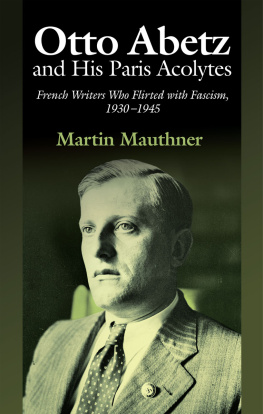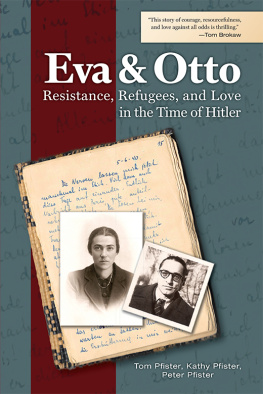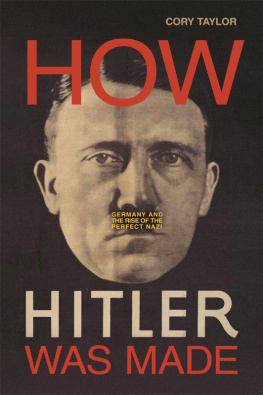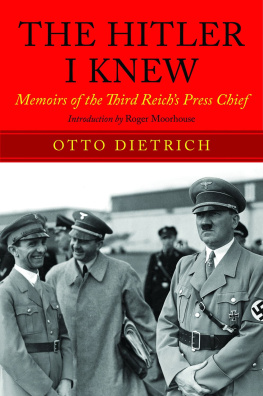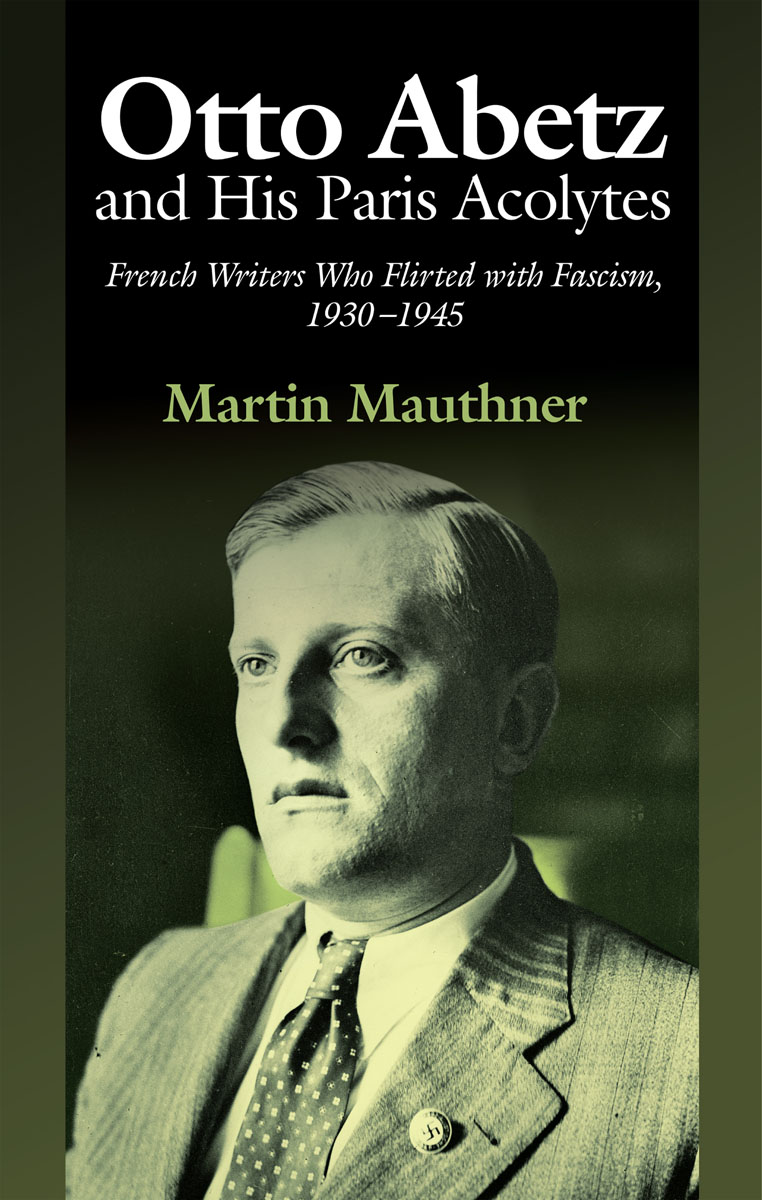
Before Hitler comes to power Otto Abetz is a left-wing Francophile teacher in provincial Germany, mobilising young French and German idealists to work together for peace through Franco-German reconciliation and a united Europe. Abetz marries a French girl but after 1933 succumbs to the Nazi sirens. Ribbentrop recruits him as his expert on France, tasking him with soothing the nervous French, as Hitler turns Germany into a war machine. Abetz builds up a network of opinion-moulding French men and women who admire the Nazis and detest the Bolsheviks, and encourages them to use their pens to highlight Hitlers triumphs.
In 1939 France expels Abetz as a Nazi agent. The following year he returns in triumph with the German army as Hitler appoints him as his ambassador in Paris. During the war Abetz (apart from securing works of art and playing a role in the deportation of Jews) manoeuvres three of his French publicist friends Jean Luchaire, Fernand de Brinon, Drieu la Rochelle into key positions, from where they can laud Nazi achievements and denigrate the Resistance. A prime question the author addresses is why these writers, and two others, Jules Romains and Bertrand de Jouvenel all of whom had close Jewish family connections supported the Nazi ideology.
At the wars end Drieu commits suicide, while Luchaire and Brinon are tried and executed as traitors. Abetz, charged with war crimes, pleads that he has saved France from being Polonised, but a French court finds him guilty and he is imprisoned. Released early, he dies in a mysterious car crash a saboteur being suspected of having tampered with the steering.
Cover illustrations are detailed within the book.
After graduating from Wadham College, Oxford, Martin Mauthner assisted Randolph Churchill with his biography of Anthony Eden and the first volume of Randolphs life of Sir Winston. Martins later career was as a senior information official of the European Union. His work involved public speaking, radio and television interviews, and organising exhibitions. The late Sir Martin Gilbert said of Martins German Writers in French Exile, 19331940 (2007), He uncovers a lost era in European literary history, and brings it powerfully to life; a magnificent depiction of remarkable individuals, their tribulations and their creativity.
Copyright Martin Mauthner, 2016.
Published in the Sussex Academic e-Library, 2016.
SUSSEX ACADEMIC PRESS
PO Box 139
Eastbourne BN24 9BP, UK
and simultaneously in the United States of America and Canada
All rights reserved. Except for the quotation of short passages for the purposes of criticism and review, no part of this publication may be reproduced, stored in a retrieval system or transmitted in any form or by any means, electronic, mechanical, photocopying, recording or otherwise, without the prior permission of the publisher.
British Library Cataloguing in Publication Data
A CIP catalogue record for this book is available from the British Library.
ISBN 978-1-78284-295-8 (e-pub)
ISBN 978-1-78284-296-5 (e-mobi)
ISBN 978-1-78284-297-2 (e-pdf)
This e-book text has been prepared for electronic viewing. Some features, including tables and figures, might not display as in the print version, due to electronic conversion limitations and/or copyright strictures.
Contents
Preface
I initially had the idea of following up my German Writers in French Exile 19331940 with a book for the general reader about French Writers Who Fled to Nazi Germany (the most noteworthy being Louis-Ferdinand Cline). I decided that it would be more fruitful to take Otto Abetz as my anchor (in the way I had used Sanary as a geographical hub in my earlier book) and concentrate on the five writers he manipulated before and during the war to promote the Nazi point of view; two of them, as well as Abetz, did flee to Germany in 1944. It may reasonably be argued that among this clutch of writers only Jules Romains and Pierre Drieu la Rochelle have any pretentions to literary significance; after all, the highest publishing accolade, a Pliade edition, has been conferred, not so long ago, upon the latters work. My interest, however, was less the literary merits of the five in question than their political service, not least when it suited both Paris and Berlin to bypass their own diplomats and rely on journalists as intermediaries.
I am indebted to various people who took time to share their knowledge with me. Dr Otto Becker, of the state archives in Sigmaringen, kindly spent an afternoon showing me the buildings where the better known French refugees worked and lived, and gave me a copy of his article on the Vichy government in Sigmaringen. Heinz Gauggel, a prominent citizen of Sigmaringen and former member of its city council who as a teenager experienced the Vichy era at first hand, kindly passed on his recollections, including his seeing Cline with his dog in the Lion Hotel. Herr Gauggel allowed me to copy some of the material from his extensive collection of documents and photographs dealing with the French enclave.
In Paris, I was fortunate to confer with Professor Zeev Sternhell, a world authority on fascism, and with Dr Laurent Kestel, an expert on fascism as a political movement in France. The late Bernard Ullmann and Monsieur Hugues de Jouvenel agreed to receive me in Paris and filled in valuable background details about, respectively, Lisette de Brinon and Bertrand de Jouvenel.
For their interest, help and encouragement, I wish to thank Geraldine DAmato, Charmian Brinson, Peter Buckman, Robyn Drury, Krystyna Kujawinska, Eleanor Levieux, Andrew Lownie, Julia MacKenzie, Catherine Mannheim, Anna Nyborg, Otto Simons, and my children Melanie, Natasha and Hugo and their partners Adam, David and Nicola.
List of Illustrations
The author and publisher gratefully acknowledge permission to reproduce copyright material, detailed below. The publishers apologize for any errors or omissions in the list and would be grateful to be notified of any corrections that should be incorporated in the next edition or reprint of this book.
Cover illustrations
B ACK: Abetz and Fernand de Brinon, who, steered by Abetz, became Vichys ambassador in Paris. Brinons wife, Jewish by birth, became an honorary Aryan. An ambitious Brinon yearned to play a key role in helping pilot the French and German ships of state along parallel courses to enduring peace in a uniting Europe. SZ Photo/Scherl/Bridgeman Images.
Plate section (after )
Internal illustrations
Black Forest Camp Fires
Otto Abetz and the Sohlberg Circle
In a Latin Quarter military prison a high-ranking German diplomat awaits trial by a French military court. A few years earlier, the Gestapo used that same Paris jail, the Cherche-Midi, to maltreat Resistance fighters. Now it is the former Nazis turn to face not torture, but French justice. Preparing to defend himself against charges of war crimes, he reflects on his life. As he sees it, his is a cruel fate for a man not yet fifty years old. And for someone who so deeply desired to bring France and Germany closer together as the engine of the new Europe, it is one full of irony.
Born and brought up near the Rhine, a much-contested natural border with France, Otto Abetz learned to adore many facets of France and French civilization. He fell in love with and married a French girl. Such was Abetzs unswerving commitment to reconciling Germany with its traditional enemy that in just over ten years he rose from being a poorly paid and progressively minded art teacher in provincial Baden to becoming Berlins envoy in wartime Paris. A Parisian lawyer with a Sephardic background, Andr Weil-Curiel, who knew and observed him as he advanced, hailed Abetz as one of the most remarkable men of his epoch.
Next page
